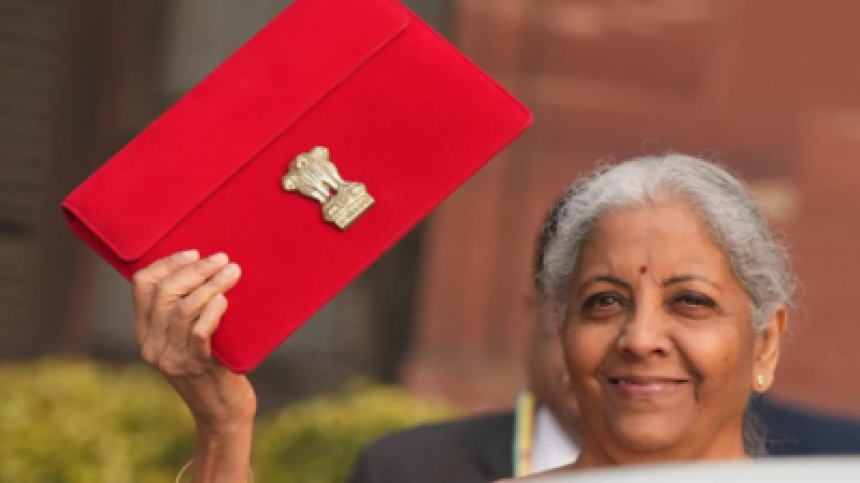Union Finance Minister Nirmala Sitharaman on Saturday is currently presenting the annual budget at the Parliament. Nirmala Sitharaman presented her record 8th consecutive budget today in the Lok Sabha.
₹99,858.56 Crore allocated to Health Ministry
“The Union Budget 2025-26 significantly invests in healthcare, allocating ₹99,858.56 Crore to the Ministry of Health and Family Welfare. This represents a 191% increase since 2014-15, demonstrating the government’s commitment to improving the health and well-being of all citizens,” the Union Health Ministry posted on X.
Viksit Bharat encompasses zero poverty, 100 pc quality education, comprehensive healthcare, says Finance Minister Sitharaman in her budget speech.
She also announced establishment of makhana board in Bihar. “Makhana Board will be established in Bihar to improve production and processing of fox nut,” Sitharaman said.
Medical seats, daycare cancer centre in FM’s annual budget
1.1 lakh medical undergraduate and postgraduate seats have been added since 2014, said Sitharaman, and added that in the next year 10,000 additional seats to be added in hospitals and colleges. She also added that government will facilitate setting up of daycare cancer centre in all district hospitals in next 3 years.
To provide relief to patients suffering from cancer, rare diseases 36 life saving drugs to be fully exempted from custom duty; 6 life saving medicines for concessional exemption.
Cost norms for nutritional support programmes to be enhanced
Presenting the annual budget, Sitharaman said Saksham Anganwadi and Poshan 2.0 programmes provide nutritional support to over 8 crore children, 1 crore pregnant and lactating women, and 20 lakh adolescent girls in aspirational districts and the northeast region. “The cost norms for these nutritional support (programmes) will be enhanced accordingly,” the finance minister said.
Medical tourism in India to be promoted in partnership with private sector
Promoting medical tourism boosts a country’s economy by attracting international patients, increasing foreign exchange earnings, and creating jobs in healthcare and hospitality. It enhances healthcare infrastructure, encouraging investments in hospitals, advanced technology, and skilled professionals. Medical tourism fosters global collaboration, improving medical research and expertise. Patients benefit from high-quality, cost-effective treatments with shorter wait times. It also supports traditional medicine like Ayurveda, expanding cultural influence. By positioning a country as a global healthcare hub, medical tourism strengthens diplomatic ties, promotes wellness tourism, and enhances the overall reputation of its medical services on an international scale.
Exemption of basic customs duty on 36 life-saving drugs
36 lifesaving drugs and medicines fully exempted from Basic Customs Duty (BCD). 6 lifesaving medicines to attract concessional customs duty of 5%. Specified drugs and medicines under Patient Assistance Programmes run by pharmaceutical companies fully exempted from BCD; 37 more medicines added along with 13 new patient assistance programmes, the finance minister announced on Saturday.
Jal Jeevan Mission expanded till 2028
“Mission to be extended until 2028 with an enhanced total outlay,” the finance minister said in her budget speech.
“The extension of Jal Jeevan Mission to 2028 is a big step to ensure the safety of domestic water supply services in rural India, which will also help cover the remaining 20% of the rural households (about 3.9 crores) with tap connections. There is a need to ensure the reliability and potability of water supply as well, in addition to creating infrastructure. This extension will work towards that by focusing on the quality of water supply infrastructure, and efficient operations and maintenance through community participation. Additionally, there should be a focus on ensuring the quality of supplied water and strengthening the data monitoring infrastructure,” Nitin Bassi, Senior Programme Lead, CEEW said.
“One of the key elements that empowers people is quality, affordable and accessible healthcare”
“The budget reinforces the nation’s journey towards realizing the vision of a Viksit Bharat by driving growth and prioritizing key sectors such as agriculture, manufacturing and healthcare. In this journey focusing on people is important and the Finance Minister in the Union Budget 2025 said that a country is not just its soil but also its people; indeed, one of the key elements that empowers people is quality, affordable and accessible healthcare. The Budget reflects a strong commitment to strengthening India’s healthcare ecosystem, with commendable initiatives in medical education, cancer care, and access to life-saving medicines. The addition of 10,000 medical seats by next year with an aim to add 75,000 medical seats over the next five years will help bridge the doctor-patient ratio, while the establishment of 200 cancer centers will significantly enhance oncology care across the country. The exemption of customs duty on critical drugs for cancer and rare diseases is a much-needed step to make advanced treatments more affordable. We also welcome the government’s emphasis on medical tourism through the ‘Heal in India’ initiative, which will further position India as a global healthcare destination. Continued investments in healthcare infrastructure, innovation, and accessibility will be key to ensuring quality care for all and achieving a truly ‘Viksit Bharat’ in healthcare,” said Abhay Soi, Chairman and Managing Director, Max Healthcare Institute Limited.
“Government is recognising that cancer is increasing in India”
“It’s in two parts, one part is that the main budget for healthcare and other sectors was announced in July, all those regulations are now carrying on, what this Budget adds on, is three-four things that are important in moving the sector forward. One was the fact that there is a 10,000 more medical education seats to be created, you need more doctors, it’s part of 75,000 seats announced last time, so operationalising 10,000 this time is a good move. Second was the recognition of fact that cancer is increasing in India and cancer treatment is expensive, and the component that is adding a lot of cost is duty on cancer drugs, so in the wisdom of the government, they have taken away full exemption to the customs duty which is a big help to the patients,” Medanta Hospitals MD and CII Healthcare Council Chairman Naresh Trehan told PTI.
Welcoming reforms
“We welcome the announcement of establishing daycare cancer centres in all district hospitals within the next three years, and 75,000 medical seats over the next five years. The addition of 200 centres in 2025-26 in all district hospitals will make treatment more affordable and accessible, especially for patients from the rural areas. The plan to introduce 10,000 more medical college seats in FY26 is a significant step towards strengthening healthcare accessibility and capacity. The addition of 36 life-saving drugs to the list of medicines fully exempted from basic customs duty, along with six more medicines under concessional duty, will significantly reduce treatment costs for patients. Also, the provision of broadband connectivity for primary health care centres will enhance access to healthcare services,” said D. S. Negi, CEO, Rajiv Gandhi Cancer Institute & Research Centre (RGCIRC).
“Broadband connectivity to primary healthcare centers will ensure the accessibility of medical advice at all times. This step will optimise the use of telemedicine and solve the problem of access to medical advice in remote areas. Further announcement towards expansion of medical education i.e. introduction of 10,000 seats targeting a total of 75,000 seats in the next five years, is a welcome step and will partly address the current unavailability of medical professionals,” said Joydeep Ghosh, Partner, and Industry Leader for Life Sciences & Healthcare, Deloitte India.
“Budget 2025-26 marks a significant step forward for India’s healthcare sector, reinforcing its role as a cornerstone of Viksit Bharat. Key reforms—expanding medical education, strengthening Heal in India, promoting medical tourism, allowing 100% FDI in insurance, extending PM-JAY to gig workers, enhancing cancer care affordability, and equipping primary healthcare with broadband connectivity—are crucial strides toward greater accessibility and equity. With a strong focus on Public-Private Partnerships (PPP) and ease of doing business, the budget also underscores the critical role of private sector collaboration in making healthcare a foundational pillar of a developed India. However, to establish India as a global healthcare leader, greater emphasis on innovation in diagnostics is essential. Advancing precision medicine, strengthening preventive care, and improving access to diagnostic testing will accelerate progress. The expansion of broadband in primary health centres is a welcome move, enabling telemedicine to bridge rural-urban healthcare gaps. While the budget lays a strong foundation, critical areas like GST rationalisation in healthcare require urgent attention. Increasing the tax exemption for preventive health check-ups, extending benefits to multiple family members, and integrating outpatient diagnostics into insurance packages will significantly enhance affordability and encourage proactive health management. We look forward to continued dialogue and effective implementation to build a more resilient, inclusive, and future-ready healthcare system,” Ameera Shah, Promoter and Executive Chairperson, Metropolis Healthcare Ltd.
“The Union Budget 2025 – 26 continues to build upon India’s growth story by focusing on the Garib, Youth, Annadata and Nari, making sure that the four pillars of the economy are well taken care of. Committing to women empowerment alongside better health care is very significant, and the Saksham Anganwadi and Poshan 2.0 schemes will support nutrition to mothers, children, and adolescent girls. These initiatives will go a long way in making India a healthier nation. The daycare cancer centres in the district hospitals will be the most beneficial announcement as they ensure that people all around the country will have easy and timely access to cancer care. Further, the inclusion of 36 life-saving drugs into the full customs duty exemption and the concessional rates for others will aid patients suffering from cancer, rare diseases, and chronic conditions. Strengthening the Indian medical economy and making vital medicines more affordable will have a positive impact on society. A customized tariff structure will aid the pharmaceutical sector in making manufacturing and the export of medicines easier, putting India in a stronger position as a pharmaceutical superpower. The government’s intention of lowering the ‘Ease of Doing Business’ and the new manufacturing mission under ‘Make in India’ will also boost development and further aid the innovation. This budget strengthens India’s consumption story as well as further inclusion. As we step forward into a ‘Viksit Bharat’, the areas of healthcare, women, and industrial expansion will greatly influence the tomorrow,” said Dr. Saloni Wagh, MD, Supriya Lifescience Ltd.
Preventive healthcare for gig workers is a necessity
“By including gig workers under the Ayushman Bharat health insurance scheme and issuing identity cards, the government is providing much-needed social security to a segment that plays a vital role in today’s economy. Preventive healthcare is especially crucial for gig workers, who often work long hours in physically demanding jobs while struggling with financial insecurity. Without regular check-ups and wellness support, small health issues can turn into major problems, impacting both their well-being and ability to earn. Ensuring access to preventive care – such as health screenings, lifestyle awareness, and wellness programmes – can reduce long-term medical costs and improve their quality of life. Therefore, a strong, accessible preventive healthcare system will not only support gig workers but also contribute to a healthier, more productive workforce – ultimately strengthening India’s economy. It’s time to prioritise their health and recognise their invaluable contribution to our daily lives,” said Saurabh Bothra, CEO, Habuild.
Meanwhile, the Economic Survey tabled in Parliament on Friday projected India’s economy to grow between 6.3 per cent and 6.8 per cent in the next financial year 2025-26. The survey, tabled a day before the union budget, highlights that the country’s economic fundamentals remain strong, supported by a stable external account, fiscal consolidation, and private consumption. “The fundamentals of the domestic economy remain robust, with a strong external account, calibrated fiscal consolidation and stable private consumption. On balance of these considerations, we expect that the growth in FY26 would be between 6.3 and 6.8 per cent,” it said.
The budget allocation for the Department of Health & Family Welfare increased by 85% from Rs. 47,353 cr in 2017-18 (BE) to Rs. 87,657 cr in 2024-25 (BE)
The budget allocation for the Department of Health & Family Welfare (DoHFW) has increased by 85% from Rs. 47,353 crores in 2017-18 (BE) to Rs. 87,657 crores in 2024-25 (BE). Further, the 15th Finance Commission provided Rs. 70,051 crore Grants for health through the local Governments.
The Indian government had allocated ₹90,958 crore for healthcare in the 2024-25 fiscal year, reflecting a 2% increase from the previous year focusing on enhancing infrastructure, strengthening existing healthcare programs, and integrating maternal and child health initiatives under the National Health Mission to improve overall healthcare services.
Nirmala Sitharaman creates history with 8th consecutive budget
Finance Minister Nirmala Sitharaman on Saturday made history as she presented a record eighth consecutive budget, which comes in the backdrop of slowdown in economy and demand for tax cuts for middle class.
This will take Sitharaman closer to the record of 10 budgets that were presented by former Prime Minister Morarji Desai over different time periods. Desai has presented a total of 6 budgets during his tenure as finance minister from 1959 to 1964, and 4 budgets between 1967 and 1969.
Nirmala Sitharaman and Minister of State for Finance Pankaj Chaudhary met President Droupadi Murmu at the Rashtrapati Bhavan ahead of the Union Budget.
President Murmu offered ‘dahi-chini’ to the Union Finance Minister. This is a customary sign of wishing good-luck. During their meeting, the Finance Minister was seen discussing the contours of the Budget proposals with the President. Sitharaman had in her first Budget in 2019 replaced the leather briefcase — which was in use for decades for carrying Budget documents — with a traditional ‘bahi-khata’ wrapped in red cloth. This year’s Budget would be in paperless form, as done in the last three years.
The first part of the Budget session will continue till February 13 and the two Houses will again meet on March 10 after recess with the session concluding on April 4.






